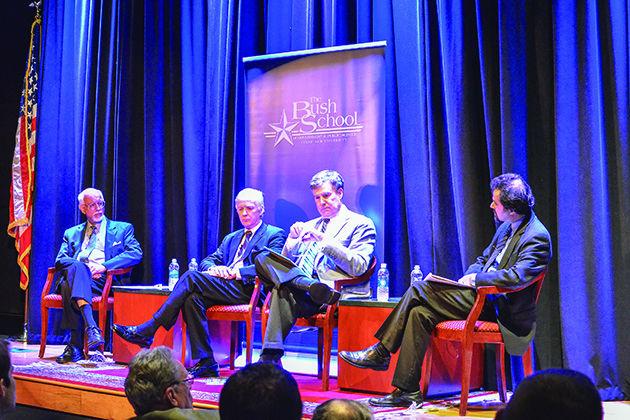In an effort to unpack the conflict surrounding the Islamic State group, an increasingly influential presence in the Middle East formerly known as ISIS, the Bush School of Government and Public Service hosted a roundtable Wednesday.
The Islamic State has garnered international attention due to a campaign through Iraq and Syria and a series of executions of journalists, including American Steven Sotloff.
Ryan Crocker, dean at the Bush School and former ambassador to six Middle Eastern countries, said what makes the Islamic State group unique is its control of a substantial amount of land.
“What distinguishes the Islamic State is they control territory, and we have not confronted an Al Qaeda-like entity that has the space, the strategic depth and the security to plan long-range complex operations since 9/11,” Crocker said. “That is the adversary we’re facing now. They control large swaths of Iraq and Syria.”
In regards to the administration of President Barack Obama, Crocker said the president has made a promising start against the Islamic State group. But despite a coalition that includes countries in the Middle East, Crocker said the U.S. mission to curb Islamic State group initiatives will be far from easy.
“We went in with five other Muslim states,” Crocker said. “That makes the point pretty graphically that this is not about the return of the crusaders to the domains of Islam. These are moderate Muslims standing up to an extremist threat that faces us all. Again, so far so good, but as the president has said, this is going to be a multi-year campaign.”
Gregory Gause, head of the international affairs department at the Bush School, said the Islamic State group’s claim that it has established a caliphate is a response to Islamic extremists’ lack of success in recent history.
“We’ve had 250 years of westerners pushing Muslims around, and I think that this appeal of the caliphate is a radical effort to reclaim that power in the world,” Gause said.
Mohammad Tabaar, professor of international affairs at the Bush School, said the possibility of a potential agreement between the Islamic State group and Iran is highly unlikely.
“It’s possible hypothetically, but is it likely? I don’t think so,” Tabaar said. “However, if we keep talking about this possible alliance between ISIS and Iran, it could become a self-fulfilling prophecy. Both of them are practical. They could join forces, but that does not mean that they are natural allies.”
Gause said the Islamic State group’s military threat should not be exaggerated, but the threat of its ideology should be a domestic concern.
“The real threat that these guys pose is that they’re going to have sympathizers within their own society that are going to disrupt — perhaps through terrorist means, perhaps through political means — they’re going to disrupt your security domestically and try to encourage political opposition,” Gause said. “I think that’s what the Saudis fear.”
Bush School faculty, including dean Ryan Crocker, were panelists in Wednesday’s roundtable.
Photo by Nikita Redkar
Panelists tackle topic of Islamic State
September 25, 2014
0
Donate to The Battalion
$2790
$5000
Contributed
Our Goal
Your donation will support the student journalists of Texas A&M University - College Station. Your contribution will allow us to purchase equipment and cover our annual website hosting costs, in addition to paying freelance staffers for their work, travel costs for coverage and more!
More to Discover










